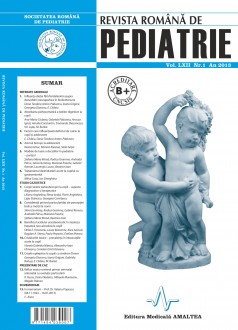SELECT ISSUE

Indexed

| |

|
|
|
| |
|
|
|

|
|
|
|
|
|
|
HIGHLIGHTS
National Awards “Science and Research”
NEW! RJP has announced the annually National Award for "Science and Research" for the best scientific articles published throughout the year in the official journal.
Read the Recommendations for the Conduct, Reporting, Editing, and Publication of Scholarly work in Medical Journals.
The published medical research literature is a global public good. Medical journal editors have a social responsibility to promote global health by publishing, whenever possible, research that furthers health worldwide.
Influence of Phenylalanine-free diet on neuro-psychological development in phenylketonuria
Dana Teodora Anton-Păduraru, Ioana Grigore, Georgeta Diaconu and E. Cîrdeiu
ABSTRACT
Phenylketonuria has long been an incurable disease. In the last decades, early detection by newborn screening and the introduction of phenylalanine-free diet have positively influenced the neuro-psychological development of these patients. The pathogenesis of cognitive dysfunction is still unknown although there has been significant progress in understanding the disease. In literature, the emphasis is on increased concentrations of phenylalanine in the brain, as pathological substrate of mental retardation. However, in addition to phenylalanine neurotoxicity, a deficit in neutral amino acids in the brain may be an important factor that affects cognitive function in phenylketonuria. Mental development depends on when the treatment is initiated and its continuation. In children with phenylketonuria treated early and continuously, intelligence quotient is normal, but below the average for the general population. In conclusion, the pathogenetic cascade of brain dysfunction in phenylketonuria starts with the effect of the high blood Phe concentration on metabolite transport through blood-brain barrier associated with a deficit of neutral amine acids in the brain. Dietary phenylalanine restriction remains the treatment of choice, especially during childhood.
Key words: phenylketonuria, mental retardation, diet
